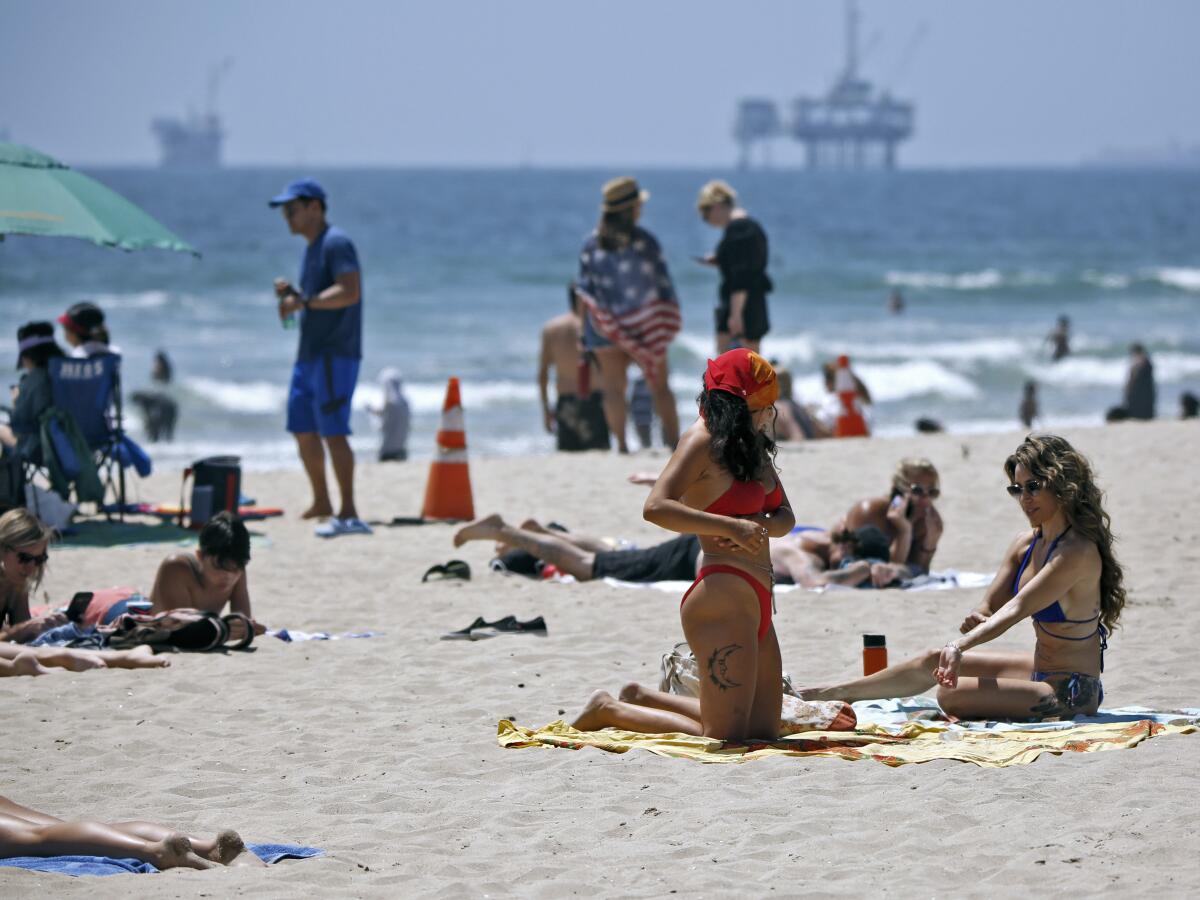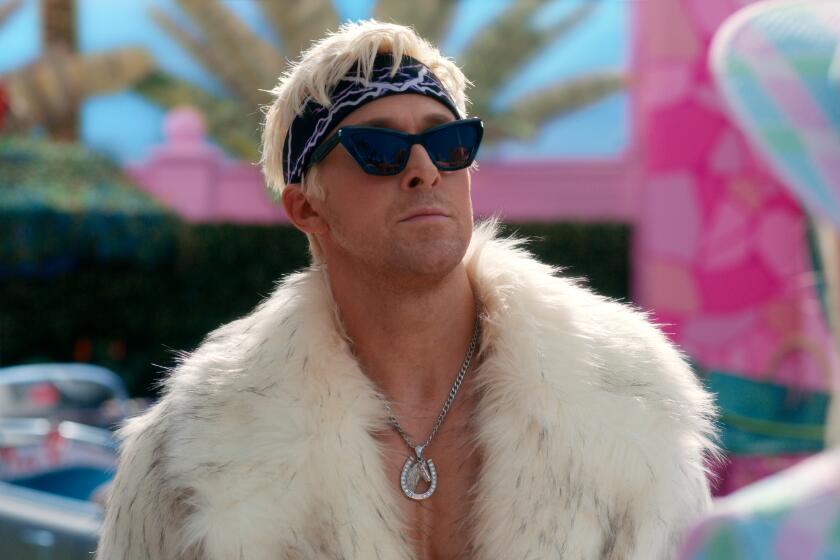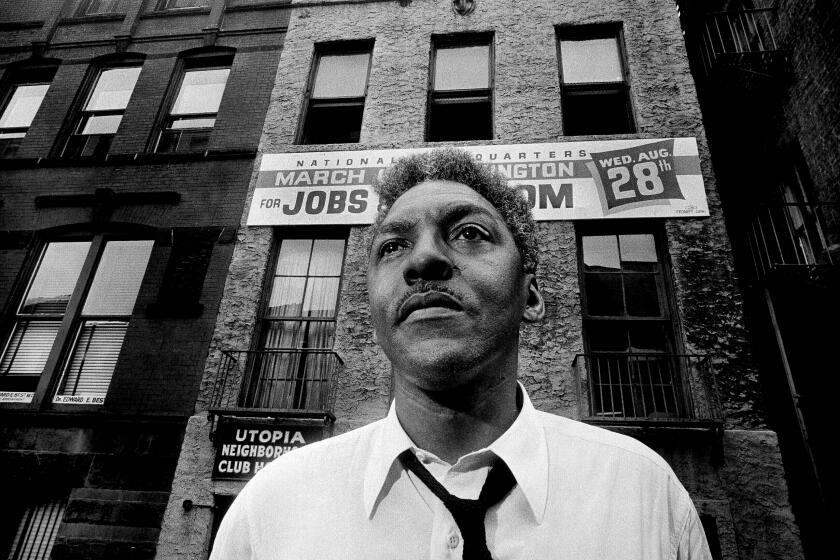I was a teenage tanning addict. Now I worry about people being fooled by anti-sunscreen TikTokers

- Share via
Like too many California millennials, I developed a tanning addiction in my teens.
In defiance of my mother, a Puerto Rican physician by way of the National Health Service Corps, I fried my skin throughout my adolescence: in the backyard, on the beach and in the local tanning salon, which charged me $30 a month for the unlimited privilege of exposing my young body to a tube-filled carcinogenic chamber prior to California’s ban on tanning bed use by minors. I repeatedly rolled my eyes at my mother’s warnings.
Opinion Columnist
Jean Guerrero
Jean Guerrero is the author, most recently, of “Hatemonger: Stephen Miller, Donald Trump and the White Nationalist Agenda.”
I remember thinking: I guess I’ll get skin cancer. Too bad, so sad.
Today, multiple skin cancer scares and mole removals later, I feel sorry for the girl I was, willing to take a big health risk to fit into a cultural beauty standard. Popular TV shows back then, such as “The O.C.” and “Laguna Beach,” glamorized the sunlit coastal lives of rich white teens. I lived close to the border in Chula Vista, but as a multiracial Latina, I bought into that fantasy. Working on my tan was part of it.
Tanning-bed use has been on the decline for years, but the rise of the anti-sunscreen movement on social media is preying on people’s fears about product safety and pushing them to reject sun protection despite medical advice.
Like the anti-vaccine universe, the anti-sunscreen world of fitness coaches, alt-medicine peddlers, “wellness” gurus and misinformed consumers crosses party lines at the paranoid juncture of the far left and far right.
Racial identity is as personal as it is a product of how we’re seen. But what is obvious to me about my Latino relatives is not how many of them see themselves.
Among influencers in the conservative camp, the medical community’s consensus on the importance of applying sunscreen every day is a liberal conspiracy to deprive people of the sun’s curative powers and men of testosterone.
Earlier this month, one right-wing influencer on X, formerly Twitter, shared a user’s bizarre claim that vitamin D makes people more “right-wing” by boosting their testosterone. “The real reason liberals hate the sun,” he wrote.
For right-wing and apolitical manfluencers, slathering on sunscreen is weak. Sunbathing is encouraged. “If you aren’t taking advantage of sunning your balls, you might want to consider it,” said one popular TikTok user. “Most sunscreen is pure b—,” said another.
On the left, the anti-sunscreen voices — self-proclaimed gurus and “independent thinkers” with no credentials — preach that UV radiation isn’t carcinogenic, contrary to overwhelming medical evidence. “Did you know that the sun does not cause skin cancer?” said one on TikTok, who argues that sunlight “can actually almost heal almost every ailment in the body.”
The film is a rare product of mainstream culture that invites men to reimagine masculinity for their own sake.
Who needs an oncologist or a dermatologist when you can get advice from sages like her?
Skin cancer is the most common cancer in the U.S., with 1 in 5 Americans developing it before age 70. Most doctors recommend using sunscreen every day, not just on sunny days, and reapplying it every one to two hours. Doing so significantly reduces skin cancer rates. Summer will soon end; you should keep using sunscreen.
Anxieties about sunscreen aren’t entirely irrational. There are two types of sunscreen: physical sunscreens that use minerals such as zinc oxide or titanium dioxide to shield the skin against UV rays, and chemical sunscreens that convert the radiation into heat.
Research shows chemical ones can be absorbed into the bloodstream. So far, the evidence doesn’t suggest that this absorption is harmful. Still, in 2019, the Federal Drug Administration asked for more safety data on a dozen commonly used chemicals, including oxybenzone, which is also thought to be harming coral reefs, leading to a ban on sunscreens that contain it in Hawaii and elsewhere.
Among some LGBTQ activists, resistance to bigotry means nonviolence and radical compassion. They believe hating the harassers doesn’t change the cycle of violence.
Anyone concerned about chemical sunscreens can stick to mineral ones. But some people don’t like the white cast many leave on darker skin. What’s important is to use something. “The best sunscreen is the one that is going to go from your counter to your skin,” says Teresa Soriano, a UCLA dermatologist who specializes in skin cancer.
Controversy over sunscreen use in the U.S. is rooted somewhat paradoxically in the cumbersome regulatory process. The FDA regulates sunscreen as a nonprescription drug, while in many other places it’s regulated as a cosmetic. The FDA hasn’t approved a new UV filter for sunscreens since 1999. As a result, the U.S. is far behind other countries in terms of effective consumer options.
In August, Rep. Alexandria Ocasio-Cortez (D-N.Y.) posted an Instagram video in which she urged people to push for access to innovative sunscreens in the U.S. “It’s not too corny,” Ocasio-Cortez said. “Please contact your member of Congress. Ask them to break through some of the regulatory barriers at the FDA.”
It’s a serious sign of something when a lot of Democrats say they support the candidacy of a Kennedy scion who embraces conspiracy theories and sews distrust about vaccines
Ocasio-Cortez’s call for action has support from Sen. Mike Lee (R-Utah), who recently posted on X: “There’s no left or right when it comes to UV light.”
Nine years ago, Congress unanimously passed a bipartisan bill to expand Americans’ access to sunscreens, expediting the FDA’s review process for active ingredients long safely used in places like Europe and Canada. Unfortunately, the progress has been slow. “Here we are in 2023, still no new sunscreen,” Michael Werner, policy advisor to the Public Access to Sunscreens Coalition, told me.
At least on the importance of sunscreen, there seems to be some political consensus. And even the anti-sunscreen crowd has something in common with people who use it religiously: the desire to stay healthy. It’s a good thing more Americans are becoming conscious of chemicals used in consumer products.
But as we try to take better care of our bodies, we should trust real health experts. It took me too long to listen to my mother. Like it or not, your doctor knows best.
More to Read
A cure for the common opinion
Get thought-provoking perspectives with our weekly newsletter.
You may occasionally receive promotional content from the Los Angeles Times.















